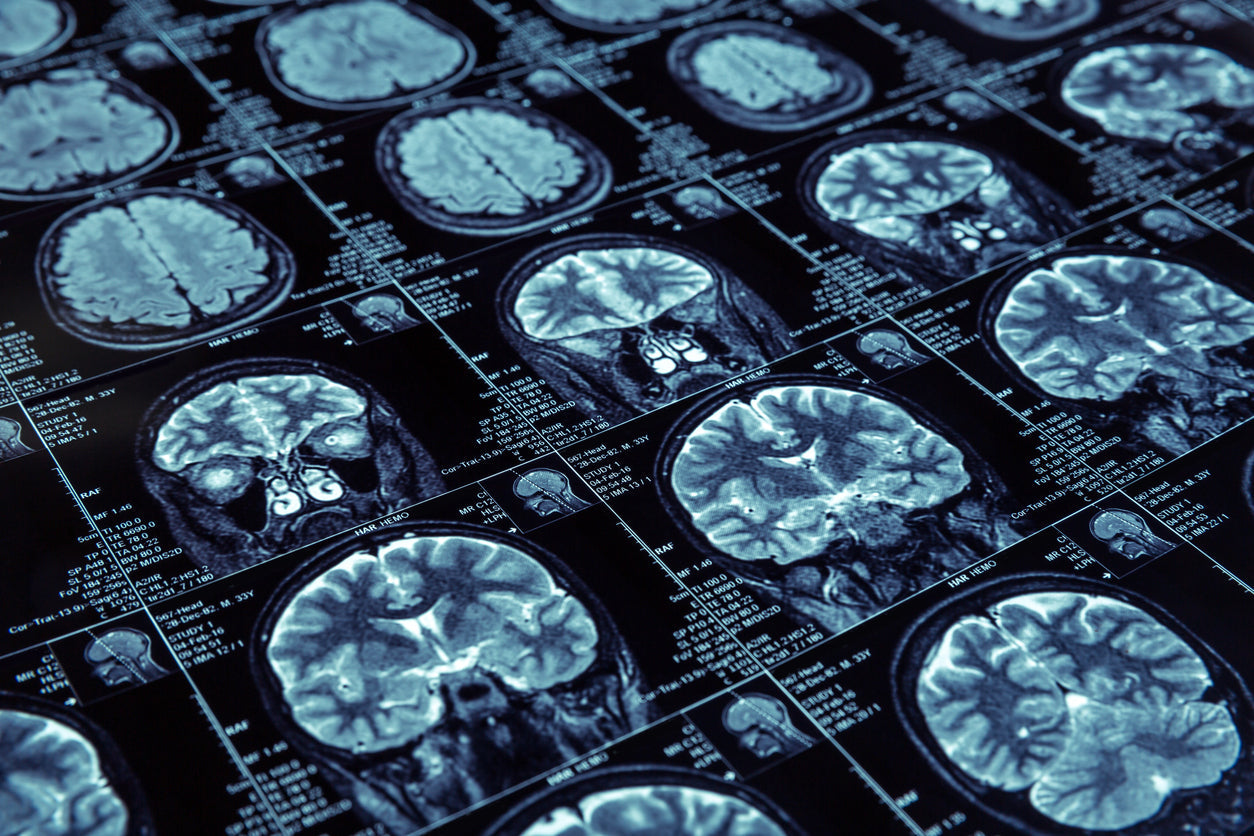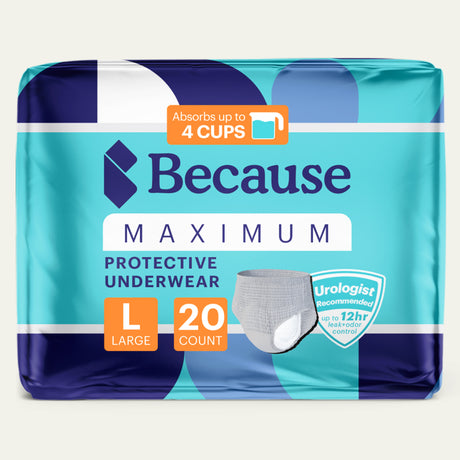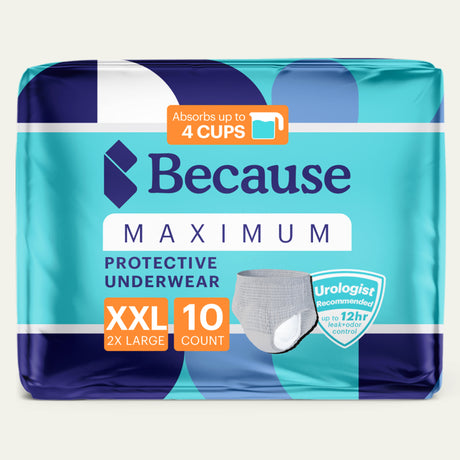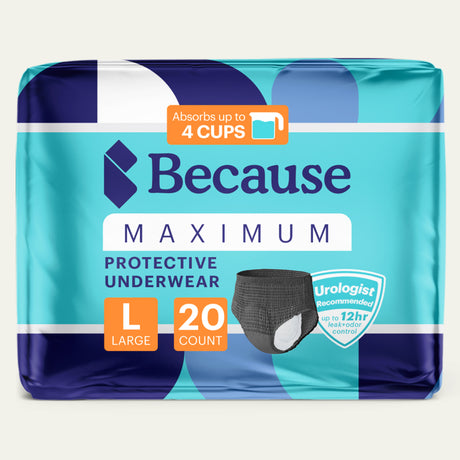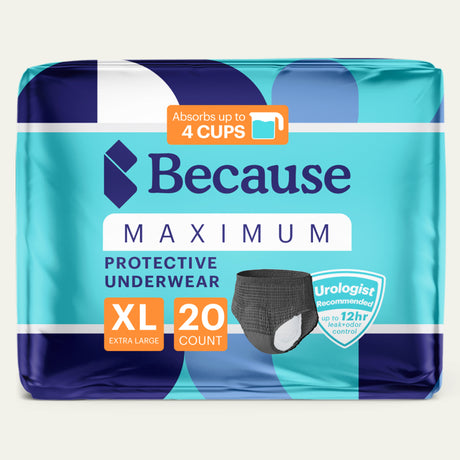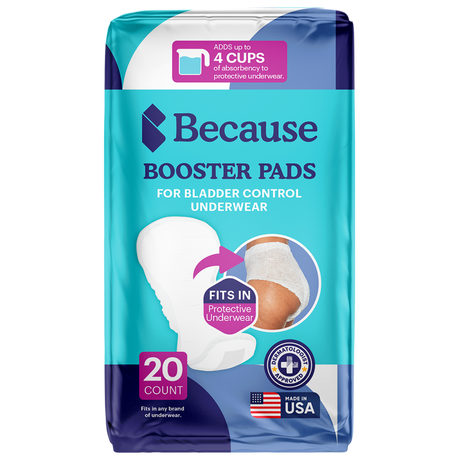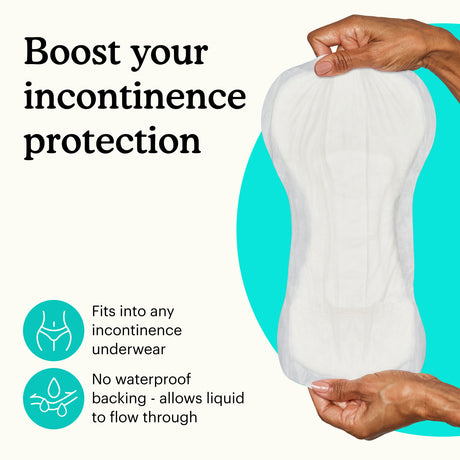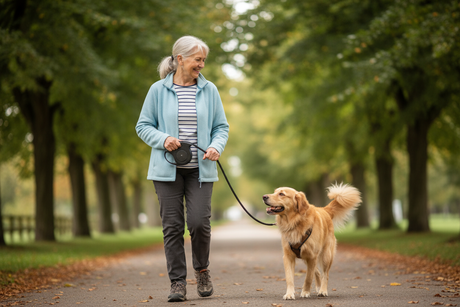Living with Parkinson’s disease (PD) presents many challenges that go far beyond the well-known mobility issues. Urinary and bowel incontinence can significantly impact the daily lives of individuals with Parkinson’s and present unique obstacles for caregivers.
As PD progresses, it affects the nervous system’s intricate control mechanisms. Loss of bladder and bowel control can become a daily reality for some patients. Navigating the complexities of Parkinson’s and incontinence requires understanding the underlying causes and open communication with your healthcare provider.
In this blog post, we hope to empower patients and caregivers with valuable information to navigate the challenges of Parkinson’s and incontinence with dignity, comfort, and improved quality of life. Let’s get started.

Does Parkinson’s Cause Urinary and Bowel Incontinence?
Does Parkinson’s cause incontinence? Unfortunately, the answer is yes. PD can cause both urinary and bowel incontinence in some patients. Incontinence occurs due to a loss of voluntary control over bladder or bowel functions, and it’s a common non-motor symptom of PD that can develop as the disease progresses.
Parkinson’s disease affects the nervous system and can lead to impairment of muscles involved in bladder and bowel control. The part of the brain responsible for regulating these functions may also become damaged, contributing to the loss of control over urination and bowel movements.
However, Parkinson’s is a complex neurological condition; not every patient will experience incontinence symptoms. The type, severity, and progression of incontinence can also vary widely from person to person.

Understanding Parkinson’s Disease
Parkinson’s disease is a progressive neurological disorder that causes unintended or uncontrollable movements, such as tremors, shaking, or muscular stiffness. It can also lead to balance issues due to postural instability and bradykinesia, or slowness of movement.
PD occurs due to the gradual loss of dopamine-producing brain cells in the substantia nigra, or the part of the brain that is responsible for regulating movement. Dopamine is a neurotransmitter vital in facilitating smooth, coordinated muscle movements.
The motor symptoms of Parkinson’s disease can make it difficult to perform everyday activities, such as walking, eating, or getting dressed. However, PD also presents with non-motor symptoms that can directly impact daily life, such as depression, sleep disturbances, and cognitive changes, as well as urinary and bowel incontinence.
This unique combination of motor and non-motor symptoms affects not only the physical abilities of individuals living with Parkinson’s but also their emotional well-being and social interactions. A multifaceted treatment approach coupled with caregiver support is crucial for helping patients manage their symptoms and maintain quality of life.
How Does Parkinson’s Impact the Urinary System and Bowels?
Parkinson’s disease can significantly impact urine and bowel control due to its effects on the nervous system. As PD progresses, the brain’s ability to control bladder and bowel function becomes impaired, leading to a range of incontinence symptoms.
For example, people with Parkinson’s may experience sudden and compelling urges to urinate that make it difficult to reach the bathroom in time. They may also experience increased urinary frequency during the day and at night (nocturia). Involuntary urine leakage and difficulty initiating urination are also possible.
PD can also slow gastrointestinal motility and lead to constipation, which may worsen due to reduced physical activity, dehydration, and the side effects of various medications. In advanced stages, loss of bowel control can occur, as well as loss of ability to completely empty the bowels, due to weakened pelvic floor muscles and reduced coordination.
The Causes of Bowel and Urinary Incontinence in Parkinson’s Patients
Understanding the causes of bowel and urinary incontinence in Parkinson’s patients can help patients and caregivers devise effective strategies for managing these symptoms.
A comprehensive approach that addresses both motor and non-motor aspects of Parkinson’s, with the help of your healthcare provider, can lead to more effective management of incontinence symptoms and improved quality of life. Here’s what you need to know:

Neurological Impact
The hallmark of Parkinson’s disease is the depletion of dopamine. Dopamine deficiency disrupts the brain’s ability to communicate with the muscles involved in bowel and bladder control. As a result, the muscles may not contract and relax effectively, leading to reduced control over urinary and bowel sphincters.
Autonomic Nervous System Dysfunction
Parkinson’s can also impact the autonomic nervous system (ANS), which regulates involuntary processes in the body, including bowel and bladder function. Dysfunction in the ANS can lead to increased bowel and bladder urgency, frequent urination, and constipation.
Motor Impairment
As Parkinson’s disease progresses, the motor symptoms like muscular rigidity, bradykinesia, and postural instability can make it physically challenging for individuals to reach the bathroom in time, contributing to incontinence issues.
Non-Motor Symptoms
Non-motor symptoms of PD, such as depression and cognitive impairment, can indirectly impact bowel and urinary function. Cognitive changes may lead to difficulty recognizing the need to use the bathroom, while emotional changes can affect pelvic floor muscles and exacerbate incontinence.
Muscle Rigidity
Muscle rigidity refers to the stiffness and resistance patients with Parkinson’s experience during muscle movement. This rigidity can affect the muscles responsible for bladder and bowel control.
This muscle rigidity may also lead to an inability to fully relax the sphincter and bladder muscles, hindering the normal emptying of the bladder and bowels. The result can be urinary retention and constipation, contributing to different types of incontinence.
Diminished Bladder Capacity
PD can also impact the bladder’s capacity to hold urine due to the loss of dopamine-producing neurons in the brain. Dopamine deficiency can affect the signals that tell the brain when the bladder is full.
As a result, the bladder may not stretch to its usual capacity, leading to more frequent urges to urinate and the bladder becoming more easily overfilled. These issues contribute to urge and overflow incontinence.
Constipation and Impactions
Parkinson’s and bowel incontinence often go hand in hand because constipation is a common non-motor symptom of the disease. Constipation can become an issue due to a combination of factors, including reduced physical activity, side effects of medications, and changes in gastrointestinal motility.
Chronic constipation related to Parkinson’s can sometimes result in the formation of fecal impactions, which are hard masses of stool that become difficult to pass. These impactions can put pressure on the rectum and lead to bowel incontinence, as liquid stool bypasses the obstruction and leaks out involuntarily.
Side Effects of Parkinson’s Medications
Some medications used to manage the symptoms of Parkinson’s disease can also contribute to bowel and urinary incontinence symptoms. For example, anticholinergic drugs that address tremors can lead to urinary retention and constipation.

Common Types of Incontinence In Parkinson’s Patients
Some individuals with Parkinson’s may never experience incontinence symptoms. Others may experience one or multiple types of Parkinson’s urinary incontinence, or fecal incontinence, at various stages of the disease.
Incontinence symptoms may not occur simultaneously and can vary in severity from person to person. Here are some of the most common types of incontinence that occur with Parkinson’s disease.
Stress Incontinence
Stress incontinence occurs when there is an involuntary loss of urine during activities that put pressure on the bladder, such as coughing or lifting heavy objects. This type of incontinence can occur with Parkinson’s disease due to weakened pelvic floor muscles, the loss of sphincter muscle control, or an inability to contract pelvic floor muscles effectively.
Urge Incontinence
Urge incontinence is the sudden, intense urge to urinate, followed by an involuntary loss of urine before reaching the bathroom. In Parkinson’s patients, this type of incontinence may occur due to dysfunctions in the autonomic nervous system, which may cause the bladder to contract involuntarily, triggering urgent, and frequent urination.
Overflow Incontinence
Overflow incontinence happens when the bladder does not empty completely during urination., leading to the constant dribbling or leakage of urine.
In Parkinson’s, overflow incontinence may occur due to the weakening of bladder muscles and reduced bladder sensation, making it difficult for patients to empty their bladders fully. The decreased coordination between the bladder and sphincter muscles may also cause urine to overflow continuously.
Functional Incontinence
Functional incontinence occurs when a person cannot reach the bathroom in time due to physical or cognitive impairment, despite having normal bladder and bowel control. Parkinson’s symptoms can directly impact mobility, making it difficult for individuals to get to the restroom promptly. Cognitive impairment and confusion may further contribute to these issues.
Bowel Incontinence
Bowel incontinence refers to an inability to control bowel movements, which leads to the involuntary passage of stool.
Bowel incontinence may occur in Parkinson’s patients due to dysfunction in the Autonomic Nervous System, which regulates bowel function. The reduced coordination of muscles involved with bowel control, coupled with chronic constipation and weakened pelvic floor muscles, can cause bowel incontinence in people living with Parkinson’s.
Treatment Options for Parkinson’s Related Urinary and Bowel Incontinence
Living with Parkinson’s disease and experiencing urinary and bowel incontinence can be incredibly challenging. But, various treatment options are available to help manage the symptoms and improve overall quality of life.
A personalized and comprehensive approach can effectively address incontinence symptoms and enable patients to better cope with the challenges of the disease.
Lifestyle Changes
Making a few small but strategic changes to your lifestyle can have a significant positive impact on your quality of life. Try to incorporate physical activity and pelvic floor exercises into your daily routine. Regular exercise can increase muscle tone and motility, improving bowel and bladder control.
Proper hydration is also essential for relieving both bowel and urinary incontinence. However, managing your fluid intake in the evenings can help to reduce the frequency of nighttime urination, allowing you to get a better night’s sleep.
Ensuring a balanced diet with adequate fiber intake can alleviate constipation, which may improve bowel and bladder control. At the same time, avoid foods that irritate the bladder to reduce urinary incontinence and the potential for urinary tract infections.
And finally, establishing a routine of regular bathroom visits, even when there is no immediate urge, can help to prevent accidents and promote better control over incontinence. Physical therapy can also be highly beneficial, especially for fecal incontinence patients.
Mobility Aids
Mobility challenges can arise as a result of motor symptoms, affecting gait and balance. The use of mobility aids can enhance independence, safety, and overall quality of life for those living with Parkinson’s.
For example, rollator walkers are versatile and sturdy mobility devices designed to support individuals with balance and walking difficulties. They typically have four wheels, hand breaks, and a seat for resting, making them ideal for patients experiencing gait instability.
Another example is a bedside commode, which is a portable table toilet that can be placed right next to the bed. Bedside commodes are ideal for individuals who have difficulty reaching the bathroom in time due to mobility issues. They offer dignity and independence for patients who require easy access to bathroom facilities.
Behavior Modification Techniques
Behavior modification techniques can also be beneficial for reducing the likelihood of accidents. Bladder training, which involves gradually increasing the time between bathroom visits, can improve bladder capacity and reduce urinary urgency.
Caregivers may also use prompted voiding techniques to remind patients to use the restroom at regular intervals, reducing the likelihood of accidents.
Medications
Be sure to discuss your symptoms with your doctor, as there are a range of medications available that may be beneficial. For example, certain medications can help to relax an overactive bladder and reduce urinary urgency. Others can address constipation and motility, improving bowel function.
Surgical Interventions and Procedures
In cases of severe urinary incontinence, some Parkinson’s patients may wish to consider interventions like incontinence Botox, sacral nerve stimulation, or urinary sphincter surgery to improve bladder control. Artificial bowel sphincter implantation may also be an option for patients with advanced bowel incontinence symptoms.
Management and Coping Strategies for PD Patients and Caregivers

Choosing Bladder and Bowel Incontinence Protection Products
Incontinence protection products, such as absorbent pads or specialized underwear, can offer comfort and peace of mind for Parkinson’s patients experiencing urinary or bowel incontinence.
Finding discreet, comfortable, and absorbent products can help boost the patient’s confidence and reduce anxiety related to accidents.
Take our bladder protection quiz to help you find the most suitable products for your type of incontinence, and we’ll send you a sample pack to try! From booster pads to briefs, we offer a wide range of sizes, styles, and levels of absorbency for both men and women.
Skin Care, Hygiene, and Managing Odors
Proper incontinence skin care is essential for managing and preventing skin irritation and breakdown. Regularly cleansing and moisturizing the skin can help maintain skin health. Gentle cleansers and barrier creams protect the skin from prolonged exposure to urine and feces.
Managing odors associated with incontinence is crucial for maintaining dignity and comfort. Using odor-absorbing products and maintaining a clean living environment with bedwetting solutions like absorbent bed protectors can help minimize unpleasant smells and enhance the patient’s well-being.
The Importance of Caregiver Support
Caregivers play a vital role in supporting individuals with Parkinson’s and incontinence. They can offer emotional support, help with daily tasks, and provide reassurance during challenging moments.
However, caregivers should also remember to care for themselves, as caring for a loved one with Parkinson’s can be physically and emotionally demanding. Seeking assistance from other family members or home health care professionals will benefit the primary caregiver and the patient.
Resources for Caregivers
Organizations like The Parkinson’s Foundation and local support groups offer valuable information, guidance, and opportunities to connect with others facing similar challenges. These resources can provide caregivers with coping strategies, education, and a sense of community to help them navigate the caregiving journey more effectively.
In Conclusion
So, does Parkinson’s cause incontinence? It can, but there are effective ways to treat and manage the symptoms to improve quality of life. Every person’s experience with Parkinson’s disease and incontinence is unique, and there is no one size fits all approach to managing its challenges.
Questions related to sensitive issues, like incontinence, can be difficult to ask, but patients and caregivers must communicate openly with healthcare professionals. Finding the most suitable strategies to enhance comfort and independence will be essential for the overall health and well-being of those living with Parkinson’s disease.
If you're struggling with incontinence, join one of our private support groups today!
Women's Incontinence Support Group
Men's Incontinence Support Group
Sources:
National Institute on Aging (NIA). (n.d.). Parkinson's disease. Retrieved from https://www.nia.nih.gov/health/parkinsons-disease
Parkinson's Foundation. (n.d.). Bradykinesia: Slowness of movement. Retrieved from https://www.parkinson.org/understanding-parkinsons/movement-symptoms/bradykinesia#:~:text=Bradykinesia%20means%20slowness%20of%20movement,Parkinson's%20diagnosis%20to%20be%20considered.
Cleveland Clinic. (n.d.). Dopamine. Retrieved from https://my.clevelandclinic.org/health/articles/22581-dopamine
Chung, S. J., Armasu, S. M., & Biernacka, J. M. (2008). Genetic susceptibility genes for depression and bipolar disorder in the dopamine and serotonin pathways: A genotype-phenotype association study in bipolar disorder with major depressive episode. Bipolar Disorders, 10(7), 856-865. doi: 10.1111/j.1399-5618.2008.00631.x
Oregon Health & Science University (OHSU). (n.d.). Understanding Parkinson's disease. Retrieved from https://www.ohsu.edu/brain-institute/understanding-parkinsons-disease
Cedars-Sinai. (n.d.). Exploring the link between dopamine and Parkinson's disease. Retrieved from https://www.cedars-sinai.org/blog/exploring-the-link-between-dopamine-and-parkinsons-disease.html
Medical News Today. (n.d.). Parkinson's disease: Dopamine deficiency explained. Retrieved from https://www.medicalnewstoday.com/articles/327450
